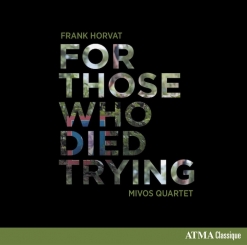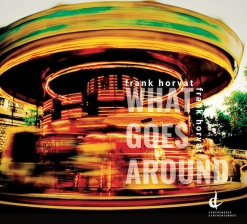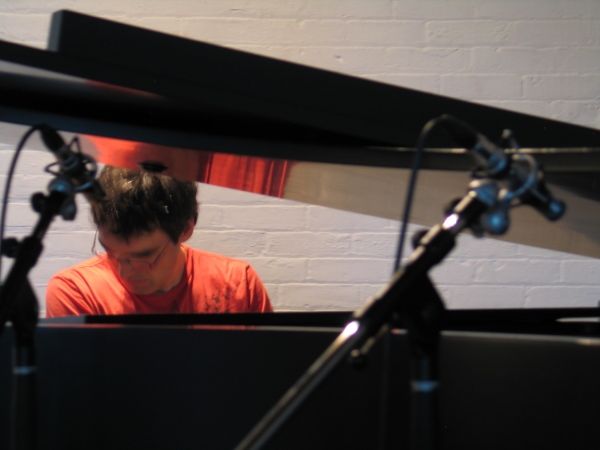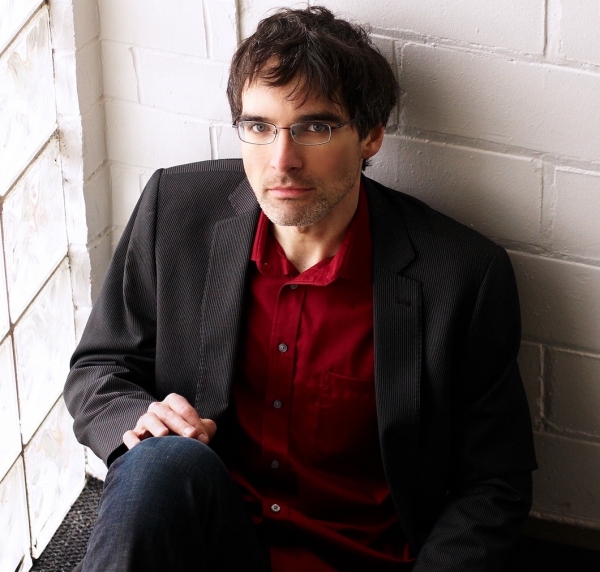
photo by Anita Zvonar
I’ve been reviewing Canadian pianist/composer Frank Horvat’s music off and on since his 2007 solo piano debut,
I’ll Be Good. Not all of Frank’s albums have been solo piano, but the three I’ve reviewed are. His mix of styles and approaches is always uniquely his own and I was anxious to learn more about him. I hope you’ll enjoy getting to know Frank a little better, too!
KP: You recently (March 2020) released a solo piano album called A Little Dark Music 2. Tell us about it.
FH: This new album is a musical reply to A Little Dark Music, an album of solo piano music I released 10 years ago. The original A Little Dark Music was my first album dedicated to social justice issues, especially the environment. Back then I wanted to create an album that allowed people to reflect and ponder these important issues. 10 years on, the world’s ability to combat climate change has not become more effective yet the need to act now is more important than ever. So ALDM2 is not just about reflection, but also a call to inspire action and genuine change.
KP: I understand that the concert performances of the first album, A Little Dark Music, have been in the dark, which makes sense, but why did you decide to do that?
FH: The main composition on that album, "Earth Hour," is a continuous 60-minute piano piece that was inspired by the international event where we collectively shut all of our lights off for an hour to support action on climate change. The symbolism to play in a darkened concert hall each time I perform this piece is very important to me…every day should be "Earth Hour."
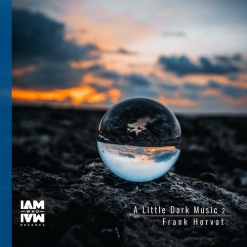
Click on album cover to go to
Kathy's review.
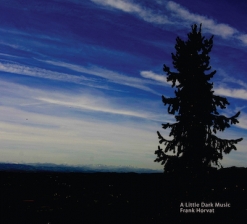
A Little Dark Music, 2010
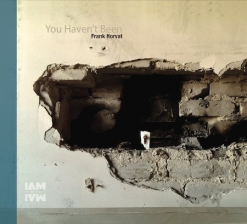
Click on two album covers above to go
to Kathy's reviews.
KP: Absolutely! I assume that the performances of the music from the new album will be in darkness as well?
FH: Yes, they will be once self-distancing measures are lifted due to the COVID-19 Pandemic. I am very much looking forward to sharing Earth Hour 2 live with audiences.
KP: On the subject of live performances, I guess most of Canada must be on lockdown with the corona virus, too?
FH: Yes, #canceleverything definitely applies here in the music community and everywhere else.
KP: Where in Canada are you located?
FH: Toronto. Like many large urban centers around the world, our city has been hard hit by the Pandemic.
KP: I think most people on the planet have been impacted in one way or another.
I was introduced to your piano music back in 2007 when I reviewed your first album, I’ll Be Good. You described that album as “a compositional puke-fest of everything that had built up within me throughout my life up to that point.” What did you mean by that?
FH: I had graduated from university in 1997. When I left school, it took me a number of years to establish myself as a professional musician. Ironically in doing that entrepreneurial work, I had pulled away from exploring and establishing my creative musical voice as a composer. It took me that 10-year span to find it and establish it. I’ll Be Good was the culmination of that intense multi-year effort and it all “bubbled up” with that album. I make it a point of listening to each of my albums once annually on the anniversary of their release date. I recently did that with I’ll Be Good and I am still very proud of the results of that album although my music has changed over the years.
KP: I’ve always thought the cover artwork for that album was fascinating with the young girl in a pink dress and long white gloves with a sledgehammer over her shoulder walking toward a beautiful grand piano in a messy old warehouse. Was the photo staged for the album cover or was it something you found elsewhere? It’s actually one of my favorite album covers!
FH: Thank you! It’s one of my favourites as well! The girl in the photo was a piano student of mine at the time. We arranged a session back then with a photographer where she held the sledgehammer facing a green screen. Then with the magic of Photoshop, she and a grand piano were implanted into a warehouse setting.
KP: The next album of yours that I reviewed was You Haven’t Been, the 2017 follow-up to I’ll Be Good, some ten years later. That one was actually much darker and more emotional. What was the concept for that album?
FH: For many years, I have battled depression. For the longest time, I could never admit to myself that I had that problem or that I should seek professional help. But eventually I did admit it to myself and my loved ones, and I started on the road to getting it under control. Once that process was well underway, I allowed my compositional voice to reflect on that journey. So, I composed a series of piano pieces that culminated into that album and a Piano Therapy Concert program. It has been a wonderful experience to have that album as a platform to share and help others with their own challenges with mental health.
KP: What an inspiring thing to do!
For those who were familiar with I’ll Be Good, the photo of the hole in the wall on the cover was an immediate tie-in! That must have been very intentional!
FH: Yes, it was. The moment I saw it, I knew that it would be the perfect representation for the themes on the new album and tie into the previous one as well.
KP: I didn’t hear the first
A Little Dark Music when you released it back in 2010, but I’m listening to it right now. It’s very different from the second one. What inspired you to do this album?
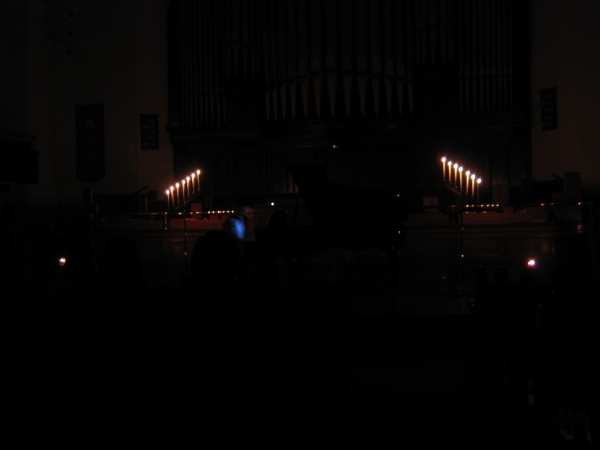
Frank performing "A Little Dark Music" in 2010.
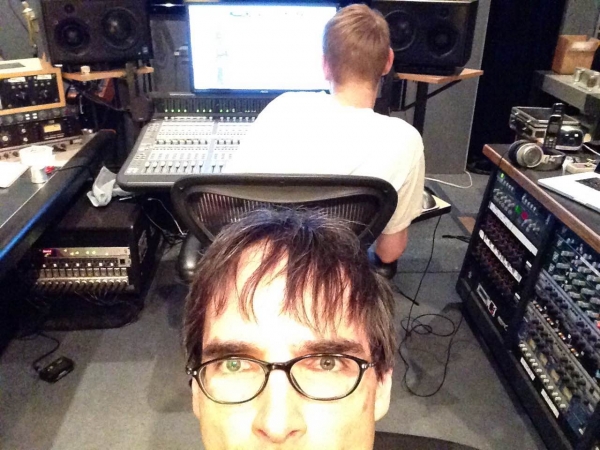
Frank in the recording studio.
FH: For as long as I can remember, I have always been quite passionate and outspoken about various social justice issues. It wasn’t until the late 2000s when I finally started to explore how I can allow my creative output to voice this through music. A Little Dark Music was my launching pad to becoming an “artivist”. I’m grateful for that experience because it gave me the confidence to produce more social justice compositions and albums on issues that are really important to me.
KP: A new word - "artivist"! I love it!
On the new album, “Earth Hour 2” is a continuous one-hour piano solo, but on the first album, “Earth Hour” is broken down into five-minute segments. Was that to make it more radio-friendly?
FH: It’s actually for more compositional reasons. "Earth Hour 1" features 12 sections, in a palindrome type fashion, each being 5 minutes in length. The piece was conceived in this stricter structural fashion. On the other hand, "Earth Hour 2" is more free-formed structurally.
KP: That makes sense!
How much improvising do you do on your recordings and in your performances? I would imagine that no two concerts are the same.
FH: I do enjoy improvising immensely. It’s a very important part of my creative process when composing. I do occasionally incorporate improvisation into my live performances. I actually wish I did it more often as it is another gratifying way to share music.
KP: As you've said, a lot of your music deals with world and social issues as well as your own life and internal experiences. What are some of the things that inspire you to compose?
FH: It’s hard to explain. Something difficult to put into words. It can just be a spark of an idea that I just can’t shake and the ideas begin to flow.
KP: You call your record label “I Am Who I Am Records,” which I love. How did you come up with that name?
FH: The name of the record company is fitting because I have always felt that I do my own thing…. march to my own drummer. Being like this is so intrinsically important to me in being the creative person I want to be even if that means not fitting in to the music community around me.
KP: Do you teach as well as compose and record?
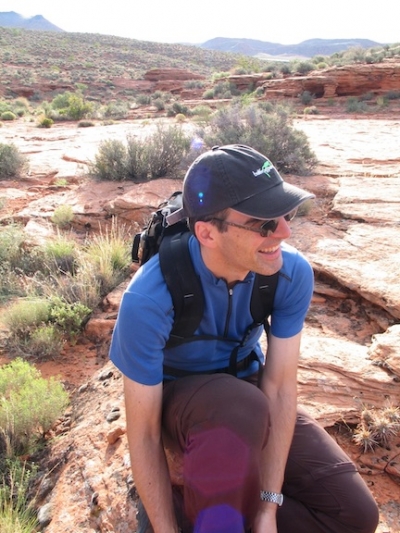
Hiking in Utah.
FH: Yes, I have maintained an active private teaching studio for many years now. Because of the time demands of performing and composing, I don’t teach as often as I used to, but I still enjoy it immensely. Performing and composing are often focused on “me”. But teaching reminds me of the importance of giving back and focusing on others. Maintaining it helps give me life balance.
KP: Very well stated! Your biography says that you are “an Associate Composer at the Canadian Music Centre.” What does that entail?
FH: The Canadian Music Centre is a wonderful institution that promotes the music of living contemporary composers in Canada. It’s an honour to be a member and have them support my creative output.
KP: You are also “the inaugural recipient of the Kathleen McMorrow Music Award for contemporary composition.” Tell us about that.
FH: In Canada, the Ontario Arts Foundation administers this award. It’s awarded annually to a composer who is composing a work recognized by a jury from the Ontario Arts Council. I feel honoured that the jury recognized my 35-movement environmental string quartet, The Thailand HRDs, which was then recorded by the Mivos Quartet and released on the album For Those Who Died Trying on the ATMA Classique label.
KP: You also have a band that you perform and record with that’s appropriately called “The Frank Horvat Band.” How many albums have you recorded with them?
FH: Two. It’s really a collective of musicians that I very much admire that I invite into the studio to record my more pop-based works.
KP: Is that music mostly instrumental?
FH: No, many are songs with vocals.
KP: How many people are in the group?
FH: In the making of those two albums, we had close to 20 musicians roll into the studio to contribute their talents at any given time.
KP: In 2019, you did a collaborative album called What Goes Around. Tell us about that album.
FH: Minimalist composition has always been a big influence on my compositional style. What Goes Around was a personal compositional challenge to make a very pure minimalist album. It’s very textural, exploring an array of instruments and even spoken voice. What makes it interesting is that most pieces were recorded by one musician who recorded all the parts and through the magic of editing we were able to put all the pieces back together. For example, there is a piece called "7 Pianos." As the name suggests, I recorded seven piano parts and then we layered them one on top of the other to create the final sound.
KP: I’ve listened to parts of that album. I’ll have to check it out more thoroughly!
Okay, let’s find out more about your background. Where were you born?
FH: Ottawa, Ontario, Canada
KP: When did you start playing the piano?
FH: I was a late starter, 11. But I had taken accordion lessons since I was 5, so the transition was easy.
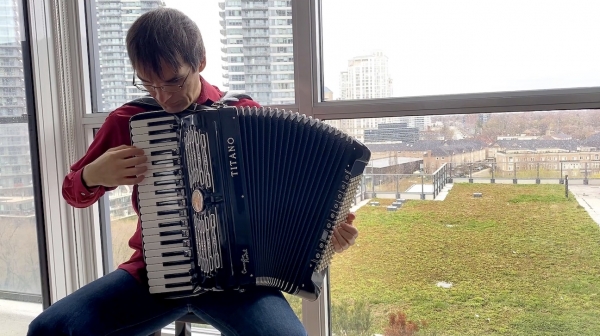
A rare accordion performance at home for Frank's "Music for Self-Isolation Project-2020."
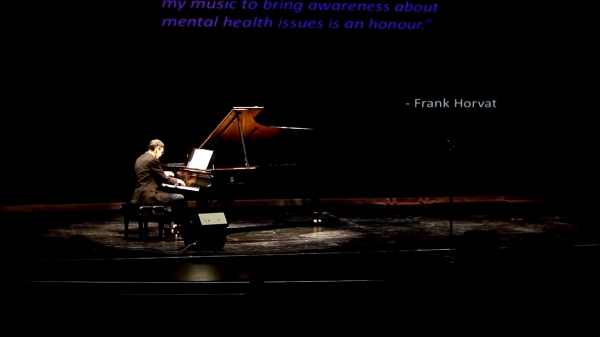
Frank's Piano Therapy Concert.
KP: How long did you take piano lessons?
FH: Until my final year of university…when I was 23.
KP: Were you encouraged to compose or improvise by your teacher(s)?
FH: Yes, especially by my first piano teacher. I was 11 or 12 when I completed my first composition and even submitted it to a local music festival.
KP: Are any of your family members musicians?
FH: I am an only child. My parents never played an instrument, but they have always loved music. Growing up, there was always music of various styles playing in the house. And as a young person, they would often take me to concerts. Those were very formative moments that shaped who I am and what I do today.
KP: Which instruments do you play besides piano?
FH: I can still play a bit of accordion. I used to play saxophone in high school and university, but I have not played in years.
KP: Who and what do you consider to be some of your musical influences?
FH: Everything and anything! In my journey through life, I will hear a story and that will motivate me to compose something. I will hear a piece of music, and that will motivate me to compose something.
KP: Who are your favorite composers?
FH: Bach, Beethoven, Liszt, Satie, Ann Southam, Philip Glass, Steve Reich, Brian Eno, Marjan Mozetich
KP: What has been your most important musical moment to date?
FH: This is hard…I’ve had so many! But I’ll go all the way back to September 2001. My wife and I had just come back from staying in the south of Spain. We had spent a week living in a house on the side of the mountain overlooking the Mediterranean. The home had no phone, no TV. I spent that week just listening to music on a Discman and thinking very deeply about what type of musician I wanted to be. Two days after we returned, September 11 happened. The tragedy of that day just confirmed that to do what is important to you without any delay is of prime importance in life. That was a turning point in my life.
KP: Wow! If you could have any three wishes, what would they be?
FH: A healthy planet. Justice and equality for all people. Love and compassion become the norm.
KP: Is there anything else you’d like to talk about?
FH: This was an intense dive into my life, Kathy. Thank you for providing this platform to engage all of us in the wonders of piano and other music!
KP: You’re very welcome, Frank. It’s been a pleasure!
For more information about Frank Horvat and his music, but sure to visit
his website and his
Artist Page here on MainlyPiano.com.
Kathy Parsons
June 2020






